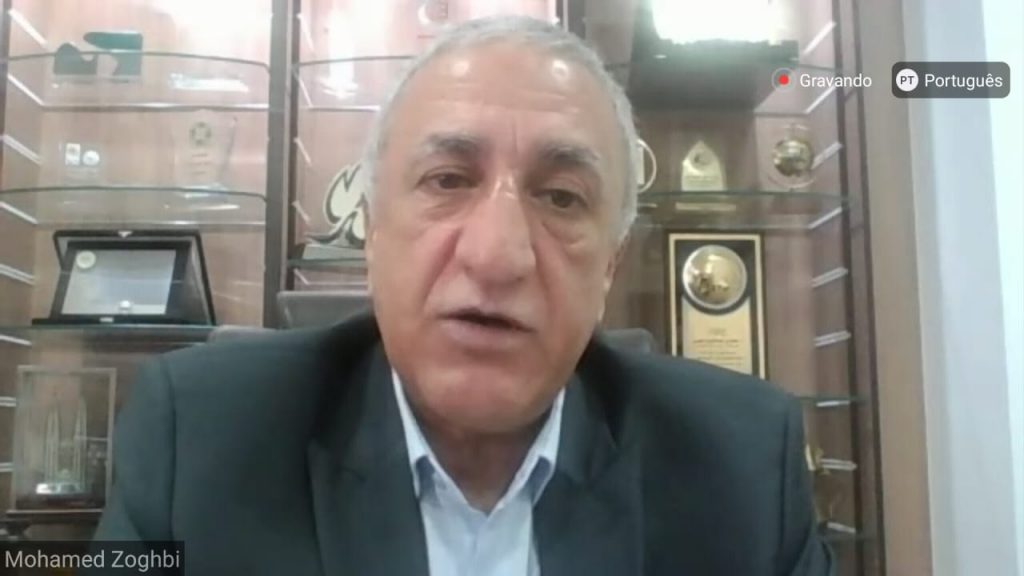São Paulo – We need to reinforce the idea that the halal certification stands out in exports not only to the Islamic world. The point was made by representations of Brazilian halal certifiers on Wednesday (10) during the webinar “Global Halal Market: Trends, Regulation and Opportunities,” hosted by the Arab Brazilian Chamber of Commerce. The online event had about 1,000 viewers and featured CDIAL Halal president Ali Saifi, Fambras Halal president Mohamed Zohgbi (pictured above), Alimentos Halal commercial director Nasser Khazraji, and Siil Halal president Chaiboun Darwiche.
Zoghbi stressed that carrying out researches for new sectors is one of the first steps to widen the halal chain. “Brazil stands out in animal protein, but we can’t forget about other growing industries. It’s a matter of time; we are working so that these industries are structured,” he said, pointing out that a technical work of market research must be done, as well as studies on individual products.
“Many companies are apt. Their growth is remarkable, and we can say that the costs are negligible, but it requires a lot of work and effort from the companies. It must be transparent, requires a lot of study. There’s no doubt that this label brings many benefits. Even in non-Islamic markets, people are choosing halal products because they are of high quality,” Zohgbi pointed out.
The executive expressed the desire that Brazil had a certifier accrediting entity. “Halal is a state policy, and we must pay attention to it. We are doing an excellent work. Naturally, we should come into the technological age and use the tools that make our job easier. Certification shouldn’t be an obstacle; it is there to support Brazilian exporters. Therefore, we do what we can’t to make things easier,” he said.
CDIAL Halal president Ali Saifi also believes that we should look at certification as an exporting channel. “The word halal shouldn’t be regarded as a barrier. Companies must see it as a business opportunity. The halal label brings many possibilities and market openness,” he said.
He believes that the certification process is simple but requires that the company has clear and well documented processes. “Certifiers now have new categories and requirements. The certification is there so that the procedure is well controlled and analyzed,” he said, pointing out that it takes effort to keep up with the changes. “Where have we failed? We must see what the market is requiring. Last year, I said that it would require more. Some companies didn’t believe, and the result? A storage certification is now required. So, Brazil must always be one step ahead,” he said.
On the other hand, Alimentos Halal commercial director Khazraji sees the pandemic as a key moment for sectors to think on how to attract the Muslim consumer. “There are many industries, such as pharmaceuticauls, that are little explored. Now everything is kind of halted, but we expect that everything will go back to normal after the pandemic. Maybe even stronger,” Halal Alimentos commercial director said, pointing out that the halal industries can grow over the next months.
Darwiche says that the certificate shows a mark of excellence in every process of the production and the service delivery. “The halal label means quality, security,” Siil Halal president said.
When asked by Arab Chamber administrative vice president Mohamad Orra Mourad about the added value the certificate gives the companies, Ali Saif was emphatic. “The halal certification makes a company grow. Just see how the animal protein industries were before and after this market. It was an outstanding growth. Maybe half of this industry’s jobs come from the Islamic market, and 50% of the Brazilian animal protein has the halal certification,” he stressed.
For Alimentos Halal commercial director Nasser Khazraji, the certification is a sound yet long-term investment. “Many companies are afraid to break into this market because they aim immediate gains. Depending on their segment, it’s important that they carry out a market study and estimate the benefits. The investment in halal is not big; it requires studying laws and documents, but this is part of any regulation. The Brazilian businessperson must be patient about the gains, which may short- or long-term,” he pondered.
Arab Chamber president Rubens Hannun pointed out that halal is the future of the market. “I strongly believe that the consumer, whether he is Islamic or not, if he has two products on his hand, one that is halal-certified and one that is not, will choose the certified one. Our challenge is show this to our companies, train the professionals, and we’ve seen that this is possible,” he said.
The event also featured Prime Group cofounder and managing partner Mohamed Badri, Halal Trade and Marketing Centre (HTMC) manager Tomas Guerrero, Jordanian Society for Organic Farming (JSOF) secretary Ibrahim Abu-Helil, Dubai Airport Free Zone (DAFZA) director general Amna Lootah, as well as Arab Chamber secretary-general Tamer Mansour.
Click below for the full webinar and other articles.
https://www.youtube.com/watch?v=EjpxO4lkGJM
Brazil has potential for diversification in halal market
Arab Chamber pens memorandum with Dubai free zone
Translated by Guilherme Miranda







